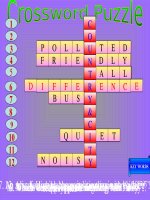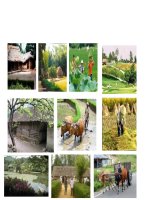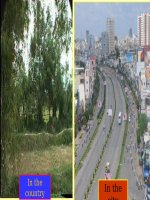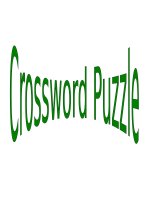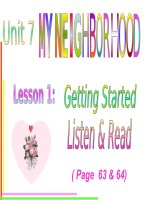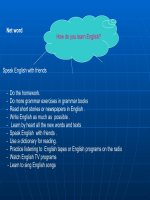Unit 10 Recyclinglisten and read
Bạn đang xem bản rút gọn của tài liệu. Xem và tải ngay bản đầy đủ của tài liệu tại đây (4.93 MB, 29 trang )
<span class='text_page_counter'>(1)</span>WELCOME TO OUR ENGLISH CLASS.
<span class='text_page_counter'>(2)</span> WARM UP. CROSSWORD PUZZLE E. A. R. T. H 1. O. T. E. B. O. F. R. U. I. T 3. O. T. H. E S. S 4. P. L. A. S E. T. N. C. L. I. O. K 2. C 5. Oranges, Bottles, It’saathing Shirts, planet bananas, bags, where skirts, raincoats apples people Jeans, are are coats .................. live made on It’s that you often write your from are................... ............... lessons on..
<span class='text_page_counter'>(3)</span>
<span class='text_page_counter'>(4)</span>
<span class='text_page_counter'>(5)</span> Monday, January 11th, 2016. Unit10: RECYCLING Lesson 2: LISTEN+SPEAK I. VOCABULARY..
<span class='text_page_counter'>(6)</span>
<span class='text_page_counter'>(7)</span> metal /ˈmetl/ (n).
<span class='text_page_counter'>(8)</span> fertilize /ˈfɜːrtəlaɪz/ (v).
<span class='text_page_counter'>(9)</span> fabric /ˈfæbrɪk/ (n).
<span class='text_page_counter'>(10)</span> leather /ˈleðər/ (n).
<span class='text_page_counter'>(11)</span> Vegetable matter / ˈvedʒtəbl/ /ˈmætər/ (n).
<span class='text_page_counter'>(12)</span> compost / ˈkɑːmpoʊst/ (n).
<span class='text_page_counter'>(13)</span> compost heap / ˈkɑːmpoʊst//hiːp/ (n).
<span class='text_page_counter'>(14)</span> grain products /ɡreɪn/ /ˈprɑːdʌkt/ (n).
<span class='text_page_counter'>(15)</span> CAN+VERB Use to make suggestions.
<span class='text_page_counter'>(16)</span> SPEAK+ LISTE N Vocabulary: 1. metal /ˈmetl/ (n) 2. fabric /ˈfæbrɪk/ (n) 3. leather /ˈleðər/ (n) 4. compost /ˈkɑːmpoʊst/ (n) 5. Fertilize /ˈfɜːrtəlaɪz/ (v) 6. vegetable matter /ˈvedʒtəbl/ /ˈmætər/ (n) 7. compost heap /ˈkɑːmpoʊst/ /hiːp/ (n) 8. grain products /ɡreɪn/ /ˈprɑːdʌkt/ (n).
<span class='text_page_counter'>(17)</span> 1 compost. grain products 5. 2 fabri c. Vegetable matter 6. 3 met al. 4 compost heap. leath er7.
<span class='text_page_counter'>(18)</span> name all things in the picture. old newspapers. food cans. schoolbags vegetables bottles plastic bags. fruit peels drinking cans. glasses. clothes jars. old books.
<span class='text_page_counter'>(19)</span> GROUPING cloth bags. fruit peels clothes plastic bags. old newspapers. drinking cans Paper Glass Plastic Vegetable matter Metal Fabric. bottles old books. jars. glasses. vegetables. food cans. old newspapers. old books. jars. bottles. glasses. plastic bags fruit peels drinking cans clothes. jars. bottles. vegetables food cans cloth bags. 40 38 39 29 35 37 28 27 26 25 24 23 22 21 20 19 18 17 16 15 14 13 12 11 10 09 08 07 06 05 04 03 02 01 00 34 33 32 31 30 36.
<span class='text_page_counter'>(20)</span> PICTURE CUE DRILL. 1. bottles / plastic. clean and refill. 2 food cans/ metal. toys. 3 clothes/ fabric. arm chair. 4 newspaper/ paper. shopping bags.
<span class='text_page_counter'>(21)</span> Model dialogue. Groups. Items. A: Which group do clothes belong to ?. Paper. used paper, old newspapers, books, cardboard boxes .. B : Put them in “fabric”. A : What can we do Glass with those clothes Plastic ? B : We can recycle them and make them into paper or shopping bags.. Metal. A : What will we do. plastic bags, plastic bottles … food cans, drinking cans, tins.. Vegetable fruit peels, vegetables matter .... A : Is fruit “ vegetable matter “ Fabric ? B : That’s right.. bottles, glasses, jars .. Leather. clothes, cloth bags, materials… shoes, sandals, schoolbags. ..
<span class='text_page_counter'>(22)</span> Model dialogue. Groups. Items. A: Which group do old newspapers belong to ?. Paper. used paper, old newspapers, books, cardboard boxes .. Glass. bottles, glasses, jars .. Plastic. plastic bags, plastic bottles …. Metal. food cans, drinking cans, tins.. B : Put them in “paper”. A : What can we do with those old newspapers ? B : We can recycle them and make them into paper or shopping bags.. Vegetable fruit peels, vegetables matter ... Fabric. clothes, cloth bags, materials…. Leather. shoes, sandals, schoolbags. ..
<span class='text_page_counter'>(23)</span> LISTEN. You will hear an expert answer four questions on how to make compost. Circle the correct answers..
<span class='text_page_counter'>(24)</span> LISTEN AND CHECK. 1) What type of garbage can you put in the compost? A A. all vegetable matter B. meat or grain products 2) Where is the best place for a compost heap? A. a Bplace that gets no sun B. a place that gets sun and shade 3) Should you water the compost? A. Yes B B. No 4) How long does it take before you can use the compost? B it rains A. after B. six months.
<span class='text_page_counter'>(25)</span> (.wav). PUT THE SENTENCES INTO CORRECT ORDER TO MAKE COMPOST. 1. Find a place in your garden that gets a few hours of sunlight each day. 2. Don’t use any meat or grain products. 3. Use vegetable matter. 4. Cover the heap with a sheet of strong plastic if the weather is very wet. 5. Keep adding the pile and after 6 months it will be ready to use as fertilizer. 6. Use picks or shovels to turn the compost regularly. . Key: 3- 2- 1- 6- 4- 5.
<span class='text_page_counter'>(26)</span> (.wav). PUT THE SENTENCES INTO CORRECT ORDER TO MAKE COMPOST. 3. Use vegetable matter. 2. Don’t use any meat or grain products. 1. Find a place in your garden that gets a few hours of sunlight each day. 6. Use picks or shovels to turn the compost regularly. 4. Cover the heap with a sheet of strong plastic if the weather is very wet. 5. Keep adding the pile and after 6 months it will be ready to use as fertilizer. Key:. 3- 2- 1- 6- 4- 5.
<span class='text_page_counter'>(27)</span> WHY SHOULD WE MAKE COMPOST? It It It It . makes soil softer and richer. is cheap. makes our environment cleaner. helps trees grow quickly…….
<span class='text_page_counter'>(28)</span> Homework. - Learn by heart the vocabulary. - Answer the question “Why should we make compost?” - Prepare: Read P92..
<span class='text_page_counter'>(29)</span> THANK YOU.
<span class='text_page_counter'>(30)</span>




